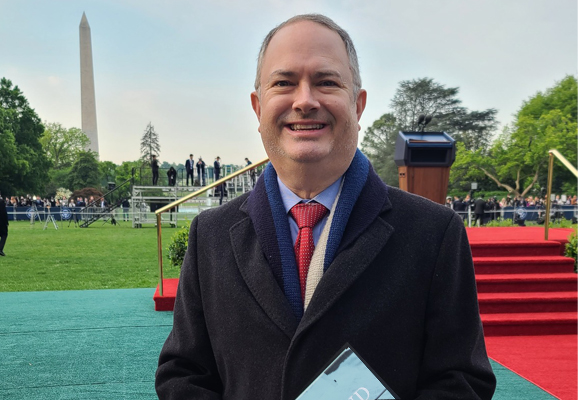
October 19, 2024
Conversations on Health Care radio celebrates 15 years. Its executive producer reflects back, and looks ahead.
Our radio show, Conversations on Health Care, hosted by Mark Masselli and Dr. Margaret Flinter, celebrates its 15-year anniversary this year. Launched at Community Health Center, Inc., Conversations on Health Care grew out of its founders’ keen interest in health policy, an interest that was, and still is, rooted in their real-world experiences of caring for vulnerable, medically underserved people. The show began in 2009 at the campus radio station at Wesleyan University in Middletown, Connecticut. Its inaugural guest was then-Speaker of the House Nancy Pelosi. Over the years, Conversations on Health Care has offered in-depth dialogue on the most current issues in health care. To honor the show and the contributions it has made to health care reporting in the United States, we talked with Adam Shapiro, Executive Producer, about the show’s history and unique approach.
This interview was edited and condensed for clarity.
Q: How is Conversations on Health Care different from other health care reporting?
AS: Most health care reporting, especially in the podcast world and the YouTube streaming world, focuses on patient care. This kind of content is designed for people who have an ailment or disease, so they can get relief. A person might be looking for techniques for how to deal with a health problem, or the latest research or other insights. Viewers tune in because they have an immediate, urgent need to find answers.
Conversations on Health Care takes a step back and says, let’s look at the ecosystem of health care in terms of public policy, research, and innovation. Challenges with climate change and how that intersects with health, issues of racial equity and health, artificial intelligence (AI) in health care—those are some of the big-picture issues covered on our show. Of course, that touches on disease and illness, but we are interested in the whole ecosystem of health and health care. And that’s unique, especially in the online world.
Q: Tell us about the show’s hosts, Mark Masselli and Dr. Margaret Flinter, and what they bring to the show.
AS: Mark and Margaret are the heartbeat of our show. They are at the front lines of health care. Every day, they run the Moses/Weitzman Health System which includes Community Health Center, Inc. in Connecticut, the largest provider of care to medically underserved people in Connecticut and one of the premier health centers in the country. Mark and Margaret bring the extraordinary knowledge and experience necessary for a high level of interaction. Every show is a peer-to-peer conversation, which makes it unique. On Conversations on Health Care, you get a real insider’s view of what is happening.
Q: How do you go about choosing guests and topics?
AS: There are really two tiers. The first tier is, people who are the top national influencers. That starts with the President of the United States, the Speaker of the House, the Secretary of Health and Human Services, Surgeon General, director of the CDC, leaders of the National Institutes of Health. There are also governors and lawmakers, regulators, and policymakers whose voices on health care policy really matter because of the positions they hold. We also invite people in the private and philanthropic sectors who are doing important work related to health care. That’s one tier. The second tier includes emerging names and people who might not have the level of recognition or the online presence, but who are doing groundbreaking, innovative work in health care. We search for them. We might see their fascinating social media or read an interesting article about them, and we think their voice is important and that they need to be part of the conversation in a bigger way. What’s interesting and fun for us—and it happens a lot—is to see them, down the road, get the national attention we thought they deserved. We talked with Dr. Jodi Halpern at the University of California—she now has a new book about artificial intelligence and its role in psychiatry. We interviewed Valerie Bauman about the sperm donor market, America’s underground surrogacy movement, before her book came out. It got a lot of attention.
Q: Is there a show in your mind that stands out for what it contributed to the public health conversation at a critical moment?
AS: I think Long COVID is a good example. We’ve had numerous shows about it. For a long time, there wasn’t any research that showed a genetic link to Long COVID. In 2022, we asked Admiral Rachel Levine, MD, Assistant Secretary of Health at the U.S. Department of Health and Human Services, a pointed question about this as we discussed the public policy implications. She firmly said Long COVID patients are not “malingering,” which is a medical term for when people are falsifying or exaggerating illness. She explained the federal government’s response. (Listen to the episode here: “Are Long Covid Patients Exaggerating?”)
Dr. Levine said that the administration and HHS believed the full completeness of the medical condition of Long COVID. Shortly thereafter, maybe about two months later, the news of the first genetic link to Long COVID came out. By going back and looking at our shows, you can really track the history and evolution of our understanding of Long COVID and how the government has responded. Those shows have gotten quite a bit of traction because many people are struggling with it and trying to understand the public sector’s response.
“To be picked up and viewed by seven million Americans—there aren’t many podcasts, and certainly no others in health care, that have had that kind of reach.”
Q: What was it like to produce the show during the COVID pandemic?
AS: We had a sense of mission. This was a national and worldwide health emergency. So much was at stake for communities and for the U.S. health care sector. You can go back and listen to the first interview we did with Dr. Anthony Fauci about COVID (listen to the full episode: “COVID-19’s Global Spread”). It was February 2020, the very start of the pandemic. He had been on our show before, and during the height of the pandemic, sometimes we were the only news outlet that Dr. Fauci had on his schedule for that day. Sometimes our interviews were picked up and used on numerous news sources, including ABC World News Tonight. To be picked up and viewed by seven million Americans—there aren’t many podcasts, and certainly no others in health care, that have had that kind of reach. That’s the amazing thing about this program that Mark and Margaret have created. We’ve been ahead in our reporting, and we always ask the important questions.
Q: What do you think are today’s critical health care topics?
AS: On November 5, we have an election that’s going to determine what kind of direction we’re going in as a country, in terms of health care. The candidates have diametrically opposed views, as they should. That’s what makes politics interesting and robust. On October 10, we aired a show that outlined the differences (listen here: “Trump v. Harris on Health Care”). We had a guest from the Center for American Progress, explaining what she and progressives want to see happen in a Kamala Harris administration. We had a guest from the Pacific Research Institute speaking from the right about their free-market principles and why they don’t want subsidies to Obamacare to continue. Congress needs to renew those subsidies next year, and our guest said the subsidies are creating more of a headache than they are solving in the insurance marketplace. What happens on November 5 and how we vote is directly going to affect how every American is paying for health care. I’m not sure that issue has really surfaced in the mainstream media. The two candidates also have very different views on reproductive rights, abortion care, and federal funding for health centers that provide transgender care. This election will have a big impact on health care.
Q: What do you see in the future for Conversations on Health Care?
AS: For the last two years, we’ve recorded shows at Aspen Ideas Health in Colorado. It has been an incredible experience. We’re grateful to the Aspen Institute for hosting us. It’s allowed us to be in-person, meeting some of the top names nationally and internationally. We would like to continue to do that kind of engagement at a high level. We certainly want to be on top of the next administration and who their policymakers are, where the ideas are coming from, and what’s happening in Congress. We’re also very interested in AI and will be digging into all kinds of topics around AI in health care. We are taking a hard look at private equity and its devastating impact on primary care. I hope there won’t be another public health emergency. But whatever happens, we will be there to provide reliable reporting. Conversations on Health Care will continue to provide the in-depth perspective our listeners truly value and appreciate.
